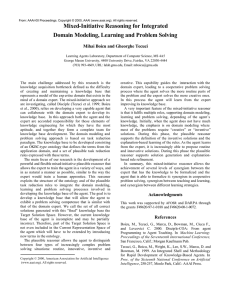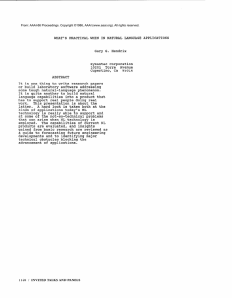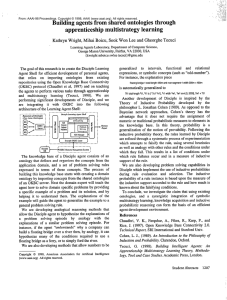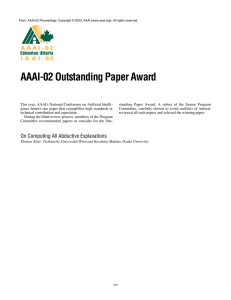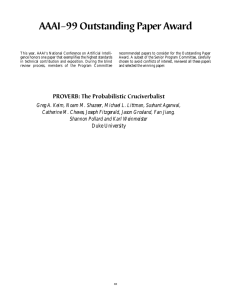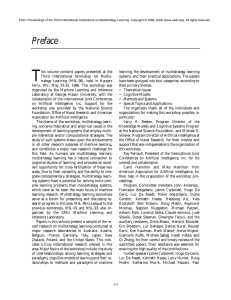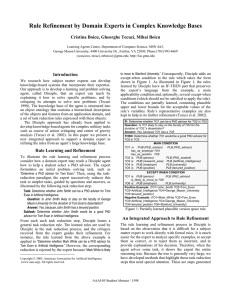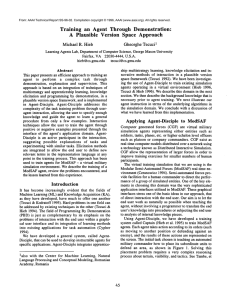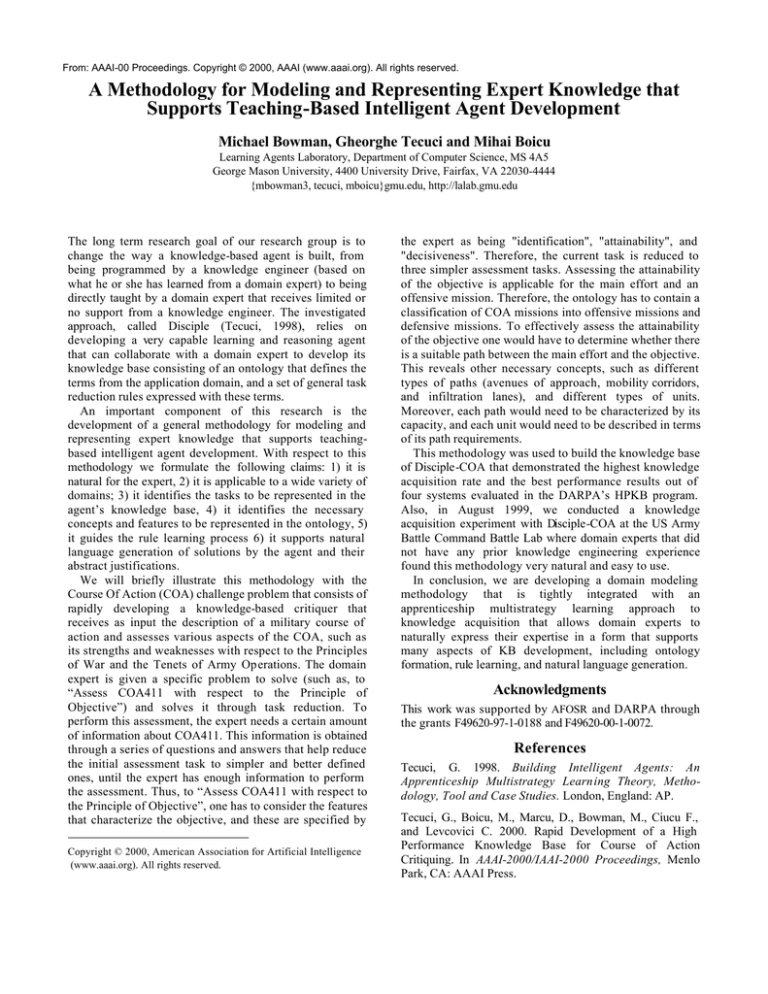
From: AAAI-00 Proceedings. Copyright © 2000, AAAI (www.aaai.org). All rights reserved.
A Methodology for Modeling and Representing Expert Knowledge that
Supports Teaching-Based Intelligent Agent Development
Michael Bowman, Gheorghe Tecuci and Mihai Boicu
Learning Agents Laboratory, Department of Computer Science, MS 4A5
George Mason University, 4400 University Drive, Fairfax, VA 22030-4444
{mbowman3, tecuci, mboicu}gmu.edu, http://lalab.gmu.edu
The long term research goal of our research group is to
change the way a knowledge-based agent is built, from
being programmed by a knowledge engineer (based on
what he or she has learned from a domain expert) to being
directly taught by a domain expert that receives limited or
no support from a knowledge engineer. The investigated
approach, called Disciple (Tecuci, 1998), relies on
developing a very capable learning and reasoning agent
that can collaborate with a domain expert to develop its
knowledge base consisting of an ontology that defines the
terms from the application domain, and a set of general task
reduction rules expressed with these terms.
An important component of this research is the
development of a general methodology for modeling and
representing expert knowledge that supports teachingbased intelligent agent development. With respect to this
methodology we formulate the following claims: 1) it is
natural for the expert, 2) it is applicable to a wide variety of
domains; 3) it identifies the tasks to be represented in the
agent’s knowledge base, 4) it identifies the necessary
concepts and features to be represented in the ontology, 5)
it guides the rule learning process 6) it supports natural
language generation of solutions by the agent and their
abstract justifications.
We will briefly illustrate this methodology with the
Course Of Action (COA) challenge problem that consists of
rapidly developing a knowledge-based critiquer that
receives as input the description of a military course of
action and assesses various aspects of the COA, such as
its strengths and weaknesses with respect to the Principles
of War and the Tenets of Army Operations. The domain
expert is given a specific problem to solve (such as, to
“Assess COA411 with respect to the Principle of
Objective”) and solves it through task reduction. To
perform this assessment, the expert needs a certain amount
of information about COA411. This information is obtained
through a series of questions and answers that help reduce
the initial assessment task to simpler and better defined
ones, until the expert has enough information to perform
the assessment. Thus, to “Assess COA411 with respect to
the Principle of Objective”, one has to consider the features
that characterize the objective, and these are specified by
Copyright © 2000, American Association for Artificial Intelligence
(www.aaai.org). All rights reserved.
the expert as being "identification", "attainability", and
"decisiveness". Therefore, the current task is reduced to
three simpler assessment tasks. Assessing the attainability
of the objective is applicable for the main effort and an
offensive mission. Therefore, the ontology has to contain a
classification of COA missions into offensive missions and
defensive missions. To effectively assess the attainability
of the objective one would have to determine whether there
is a suitable path between the main effort and the objective.
This reveals other necessary concepts, such as different
types of paths (avenues of approach, mobility corridors,
and infiltration lanes), and different types of units.
Moreover, each path would need to be characterized by its
capacity, and each unit would need to be described in terms
of its path requirements.
This methodology was used to build the knowledge base
of Disciple-COA that demonstrated the highest knowledge
acquisition rate and the best performance results out of
four systems evaluated in the DARPA’s HPKB program.
Also, in August 1999, we conducted a knowledge
acquisition experiment with Disciple-COA at the US Army
Battle Command Battle Lab where domain experts that did
not have any prior knowledge engineering experience
found this methodology very natural and easy to use.
In conclusion, we are developing a domain modeling
methodology that is tightly integrated with an
apprenticeship multistrategy learning approach to
knowledge acquisition that allows domain experts to
naturally express their expertise in a form that supports
many aspects of KB development, including ontology
formation, rule learning, and natural language generation.
Acknowledgments
This work was supported by AFOSR and DARPA through
the grants F49620-97-1-0188 and F49620-00-1-0072.
References
Tecuci, G. 1998. Building Intelligent Agents: An
Apprenticeship Multistrategy Learning Theory, Methodology, Tool and Case Studies. London, England: AP.
Tecuci, G., Boicu, M., Marcu, D., Bowman, M., Ciucu F.,
and Levcovici C. 2000. Rapid Development of a High
Performance Knowledge Base for Course of Action
Critiquing. In AAAI-2000/IAAI-2000 Proceedings, Menlo
Park, CA: AAAI Press.

